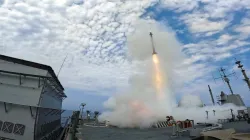DRDO to test shoulder-fired air defence missiles at high altitudes, know all about it
The Very Short Range Air Defence (VSHORAD) systems are designed to counter aerial threats such as drones, fighter aircraft, and helicopters. This effort addresses the Indian forces' shortage of updated VSHORAD missiles.

The Defence Research and Development Organisation (DRDO) is set to conduct high-altitude trials of indigenous shoulder-fired air defence missiles. These trials are a precursor to handing over the missile systems to the Indian Army for user assessments. Developed to meet the Indian Army and Air Force's need for Very Short Range Air Defence (VSHORAD) systems, these missiles are designed to counter aerial threats such as drones, fighter aircraft, and helicopters in border areas.
High-altitude testing
Defence officials disclosed that the trials will occur in mountainous regions like Ladakh or Sikkim. These tests will evaluate the missile system's performance in challenging environments.
Enhanced targeting capabilities
The missile system has demonstrated the ability to lock on and neutralise both long-range and short-range targets. Issues with short-range targeting have been resolved, and the system is progressing towards completion.
Addressing inventory shortages
Indian forces, led by the Indian Army, are addressing a shortage of various VSHORAD missiles. The Army is working on two projects worth Rs 6,800 crore to develop these systems indigenously, amid heightened aerial threats from Pakistan and China.
Current inventory status
The existing VSHORAD missiles in the Army and Air Force inventories utilise infrared homing guidance systems. The Igla 1M VSHORAD missile system, inducted in 1989, was scheduled for de-induction in 2013, highlighting the need for updated systems.
Also read | Army opens fire after suspicious movement in Kashmir’s Bandipora, two terrorists believed to be trapped
